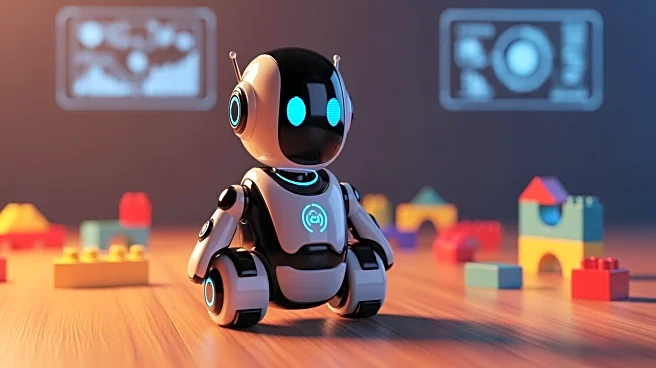What's Happening?
AI-powered toys from China are making their way to American shelves, sparking debate over their impact on children's development. These toys, valued at $34.87 billion, are projected to grow to $270 billion by
2035, with China contributing significantly to this growth. Examples include FoloToy, which allows customization and voice training, and BubblePal, a toy that interacts with children using AI language models. While these toys offer educational benefits, experts express concerns about their potential to reduce real-life social interactions and creativity. The toys' entry into the U.S. market coincides with rising apprehension about AI's influence on cognitive skills and social relationships.
Why It's Important?
The introduction of AI toys in the U.S. market could significantly impact child development, as these toys may alter traditional playtime dynamics. While they offer educational advantages, they also pose risks by potentially diminishing real-world social interactions and creativity. This development is crucial for parents, educators, and policymakers who must navigate the balance between technological advancement and preserving essential developmental activities. The toys' presence in the market reflects broader societal concerns about AI's role in everyday life, highlighting the need for careful consideration of its effects on younger generations.
What's Next?
As AI toys become more prevalent, stakeholders such as parents, educators, and policymakers will need to assess their impact on child development. This may involve implementing guidelines or regulations to ensure these toys are used responsibly and do not replace essential human interactions. Additionally, ongoing research into the cognitive and social effects of AI toys will be crucial in shaping future educational and developmental strategies. Companies like Mattel, collaborating with AI developers, may continue to innovate in this space, potentially influencing the direction of the toy industry.
Beyond the Headlines
The rise of AI toys raises ethical questions about the commercialization of childhood and the potential for technology to replace human interactions. As these toys become more integrated into daily life, society must consider the long-term implications for children's emotional and social development. The debate over AI toys also reflects broader concerns about technology's role in shaping human behavior and relationships, prompting discussions about the ethical use of AI in consumer products.








